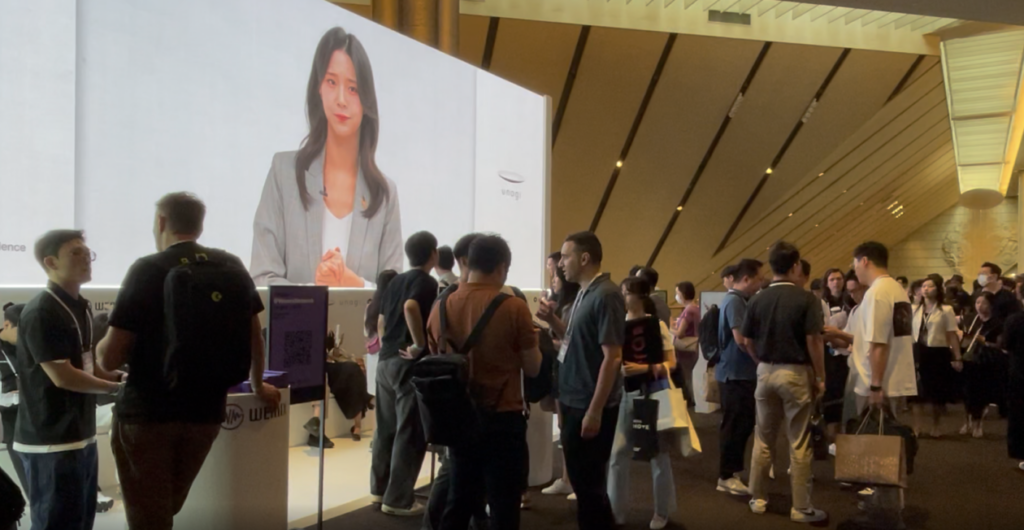Korea Blockchain Week: diverging crypto paths for the US and Asia

Taking place at the Shilla Hotel in central Seoul, the sixth annual Korea Blockchain Week’s main two-day conference, Impact, hosted 263 different blockchain companies, attracting over 6,000 participants eager to learn about the industry’s ups and downs in a year dominated by bear market sentiment.
Much of the 85 panel discussions focused on differences in the regulatory environments of the U.S. — traditionally the largest single crypto market and source of much of the industry’s funding — and Asia, where various jurisdictions including South Korea and Japan are creating a more crypto-friendly environment for developers and investors alike.
Caroline Pham, a commissioner at U.S. regulator the Commodity Futures Trading Commission (CFTC), said during her fireside chat at KBW that she sees a unified approach between policymakers, regulators and the private sector in Asia that encourages innovation.
“I think it’s funny that in the United States we have been so used to some of the tremendous successes that we’ve had in the tech sector that we take it for granted,” Pham said. “It’s like everything (in Asia) is 10 years ahead of where we are in the U.S.”
That is less related to technical skill or knowledge, she said, but “because there’s an openness to technology and to changing things.”
US scrutiny
Another U.S. regulator, the Securities and Exchange Commission (SEC), has stepped up scrutiny of the crypto industry this year based on the claim that most cryptocurrencies other than Bitcoin are securities.
This logic has guided the agency’s lawsuits against a number of digital asset firms including software developer Ripple Labs, cryptocurrency exchange Coinbase Global and Paxos Trust, the issuer of the Binance USD (BUSD) stablecoin.
Most of the SEC’s lawsuits are yet to be settled as the cryptos-as-securities claim is disputed by the companies involved. In July, the U.S. court ruled that programmatic sales of Ripple’s XRP token do not qualify as securities offerings. The SEC filed an appeal against the ruling the following month, which Ripple then asked the court to deny.
Such delays in establishing crypto rules may hinder industry growth, former White House cybersecurity director Carole House said during a talk about the regulatory landscapes of the U.S. and Asia. House warned that “overly harsh” regulation of the crypto industry could stifle blockchain innovation in the U.S.
In contrast, Konstantin Richter, the CEO and founder of California-based blockchain infrastructure company Blockdaemon, said regulatory scrutiny in the U.S. is a long-term positive for the industry, despite current difficulties.
“Ultimately, all the legal travails that we have here are going to lead to clarity, which is really all we want,” Richter said in a video interview prior to the event.
Eastward movement
While opinions varied on U.S. crypto regulation, most conference participants agreed that the Asia region is taking significant regulatory strides.
“I really do think that the Asia-Pacific has been a powerhouse driver,” House said, highlighting that Japan’s regulatory framework has contributed to the global standard for anti-money laundering in crypto.
Sam Seo, the representative director of Klaytn Foundation, the public blockchain platform from the leading South Korean mobile platform Kakao, said he foresees a wave of companies moving to Asia to take advantage of the favorable conditions.
Gemini, the cryptocurrency exchange founded by the Winklevoss brothers, announced in June that it is growing its headcount in Singapore to operate as a hub for expansion in the Asia-Pacific. Seo cited Klaytn’s new partnership with Luxembourg-based asset tokenization platform Tokeny as another example.
Sam Seo, Representative Director at Klaytn Foundation. Image: Forkast
“[Tokeny has] been operating their business for quite a long time, but they were mostly focused in the U.S. market or the Europe market. They are now looking at the Asia market,” said Seo, adding that he believes this is the “beginning of a bigger trend.”
Dominic Jang, head of business development at Singapore-based blockchain game platform Oasys, said industry movement eastward to Asia is particularly apparent in the Web3 gaming sector.
“We’re seeing more and more U.S. companies doing blockchain gaming seeking [the Asian market],” Jang said, adding that Asian audiences provide a growth market missing in the U.S. due to unfavorable regulations.
Regulatory clarity
Ryo Matsubara, a Japanese national and director of Oasys, said that regulatory clarity plays a big role in attracting business to Asia, citing the regulatory situation in Japan as an example.
He said that after the high profile hacks of the Mt.Gox and Coincheck crypto exchanges in 2014 and 2018 respectively, Japanese regulators established a strict set of criteria for cryptocurrencies.
“Under Japanese rules, crypto is crypto, not a security,” Matusbara said. “So making the [clear] definition of crypto is very important.”
In the case of South Korea, the country’s top financial regulator, the Financial Services Commission, announced a bill in July to amend securities regulations in a way that accommodates security token offerings, or STOs.
While the bill has not yet received approval by legislators, major financial institutions are already looking to expand into the digital asset industry. On Aug. 30, South Korea’s financial leaders Woori Bank, Samsung Securities and SK Securities formed an alliance for cooperation on developing security tokens.
Hong Kong also successfully rolled out its own crypto licensing regime earlier this year, positioning itself as a digital asset regulatory sandbox for China.
In Southeast Asia, Singapore and Thailand ramped up crypto user protection regulations in July. Singapore now mandates that crypto firms must hold customer assets in third-party trusts, while Thai authorities introduced bans on crypto lending and staking services. Despite the tightening of restrictions, the new rules are seen as necessary for industry growth in the two countries.
Move over, USA?
While SEC boss Gary Gensler’s term ends in June 2026, he has been on the end of calls to resign from U.S. crypto advocates who consider him hostile to the industry. #FireGaryGensler was trending on X, formerly Twitter, on Aug. 30 after a U.S. district court ruled against the SEC’s denial of Grayscale Investment’s Bitcoin exchange-traded fund proposal on the grounds it was “arbitrary.”
“His voice is quite the opposite to that of Web3 and crypto projects,” Seo said, adding that Gensler’s words have “a big impact” on the industry and its perception among the public.
Asia’s chance of challenging the U.S. to become the center of the crypto world therefore “depends on who will be the successor” to Gensler at the SEC, Seo said. If the current period of regulatory scrutiny continues much longer, he added, it could drive the nation’s talent to look for friendlier locations in Asia or Europe.
The Klaytn director concluded by saying that blockchain innovation is key to Asia’s success. While U.S. financial markets are strong, he said, Asia is far more populous and can take the reins as the world’s leader in Web3 — if it finds the right ways to put blockchain tech to use.
Source link
#Korea #Blockchain #Week #diverging #crypto #paths #Asia




